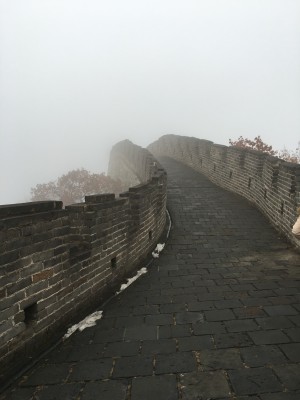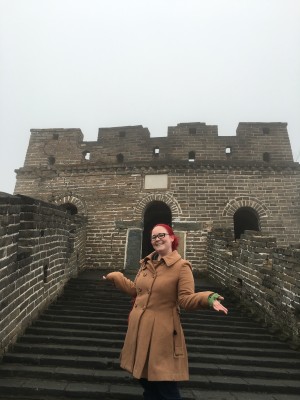Indiscretion
I am not terribly discreet about my health and the accompanying body differences. It is not in my nature. When I was growing up, I would get dressed for school in the living room in front of a window that provided an unobstructed view for anyone passing by. It took me a year to put up blinds in my current apartment because I just couldn’t be bothered. The idea that someone could see me naked is really not something that I particularly care about.
This lack of concern has extended to my day to day management of my health. This means that my health issues are pretty visible, even to people who don’t know me. My port is accessed all the time and I don’t usually wear clothes that hide it. When I had a PICC, I never wore long sleeves for the express purpose of covering the line. While many people didn’t know what I had under my clothes, they could certainly see that there was a bulge on my abdomen where the ostomy bag was. I take medication in front of other people all the time, including IV meds, sometimes in public. I sometimes need to infuse fluids during the day and so then I am walking around with a backpack holding a pump and an IV bag trailing a line connected to my port.
Also, my hair is bright red and I have distinctive glasses and dress like a 60’s housewife. Blending into a crowd is not really something that is going to happen for me.
I made a decision a long time ago to be as transparent about my health as possible in all areas of my life. During the years before diagnosis, and for about a year after, my friends and family understood in a general way that my health was not great. I was fairly functional and at that point didn’t require a lot of help to manage my day to day life.
In the winter of 2013, that changed. I crashed so hard that in the span of a few weeks I ended up unable to stand for very long, or exercise, or eat most foods, or clean my apartment, or run errands. After a couple of episodes in which I got out of bed and literally fell on my face from low blood pressure, it became obvious that I could not manage my life on my own. I was mostly unable to leave my apartment.
So I told everyone. I told my family and friends and work and pretty much everyone else I interacted with. By doing so, I was able to create an insular environment that was largely safe for me. Venturing outside of that bubble was inherently dangerous for me.
In the last couple of years, I have gradually gained more stability and more independence. I travel a lot now. In the last two years, I have been to Seattle, Colorado, Florida, California, Maine, Hong Kong, Beijing, Colorado, Maine again and Florida again. I’m currently in Naples, Florida.
Travel was a big part of my life and identity in my adult life. When I got sick, it was easily the thing I missed the most. It wasn’t even really that I wanted to go somewhere as much as I wanted to be able to go somewhere if I decided. The anxiety associated with being unable to just book a trip and go created a weird sensation of claustrophobia. I was trapped. And by traveling now, I am no longer trapped, but I am less safe.
I have written a lot about the difficulties encountered while I travel. I actually didn’t even realize how often I have written about this until yesterday when I was reading through old posts on the blog and on Facebook. I pretty much always run into trouble getting my boarding pass, despite many attempts to mitigate this ongoing problem. I sometimes have trouble even getting an airline to let me onboard the plane because some employee made a decision that I don’t look healthy enough to fly. Onboard, I often encounter trouble because I have to keep a bag with meds and an infusion pump with me at all times because the IV bag and pump are attached to my body.
And then of course there are the people who just don’t like that I’m sick. You know the people. The ones that don’t actually know you, but who make snide comments or stare.
I flew to Florida on Saturday. For the duration of that flight, I was connected to an infusion pump. The woman next to me was staring and rolling her eyes pointedly which seems awfully stupid since she could just ask me what it was if she wanted to. Two hours into the flight, I diluted a med using a needle. She finally said, “You know, it makes me uncomfortable that you’re doing that.”
I responded, “You’re going to be a lot more uncomfortable if I start going into shock,” and then pushed the med and reconnected my fluids.
Any time I venture outside of this bubble I built for myself, I accept the risk associated with a naïve and sometimes hostile environment. I find it incredible that in 2016 these issues are still present. I am clearly dedicated to educating people about mast cell disease and seize the opportunity to do so when it presents itself. But situations like this have really driven home for me that often people have already decided how they feel about what I am doing or what I look like before we even interact. In some instances, teaching them about my disease won’t help. And sometimes, it makes things worse.
There is also this sticking point: that despite the fact that I don’t try to hide my health issues, I still have a right to privacy. I don’t mind discussing my port or why I’m bright red if people ask, but I have a choice. There should not be an expectation that I disclose my private health information just because I don’t look like everyone else.
Our stories as patients are our greatest weapons against ignorance and fear about our diseases. They are our greatest assets in making the world safer for us and people like us.
But they are still your stories. And telling them is a choice.


